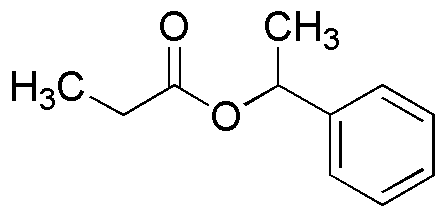Phenethyl propionate is widely utilized in research focused on:
- Fragrance Industry: This compound is commonly used in perfumes and scented products due to its pleasant floral aroma, enhancing the overall fragrance profile.
- Flavoring Agent: It serves as a flavoring agent in food products, providing a sweet, fruity taste that is particularly appealing in confectionery and beverages.
- Cosmetics: In cosmetic formulations, it acts as a skin conditioning agent, improving texture and moisture retention in creams and lotions.
- Aromatherapy: Used in essential oil blends, it contributes to calming and uplifting scents, making it popular in wellness products and diffusers.
- Research Applications: In laboratory settings, it is utilized as a standard in analytical chemistry for the identification and quantification of similar compounds in various matrices.
Informations générales
Propriétés
Sécurité et réglementation
Applications
Phenethyl propionate is widely utilized in research focused on:
- Fragrance Industry: This compound is commonly used in perfumes and scented products due to its pleasant floral aroma, enhancing the overall fragrance profile.
- Flavoring Agent: It serves as a flavoring agent in food products, providing a sweet, fruity taste that is particularly appealing in confectionery and beverages.
- Cosmetics: In cosmetic formulations, it acts as a skin conditioning agent, improving texture and moisture retention in creams and lotions.
- Aromatherapy: Used in essential oil blends, it contributes to calming and uplifting scents, making it popular in wellness products and diffusers.
- Research Applications: In laboratory settings, it is utilized as a standard in analytical chemistry for the identification and quantification of similar compounds in various matrices.
Documents
Fiches de données de sécurité (FDS)
La FDS fournit des informations de sécurité complètes sur la manipulation, le stockage et l’élimination du produit.
Spécifications du produit (PS)
Le PS fournit une description complète des propriétés du produit, notamment sa composition chimique, son état physique, sa pureté et les exigences de stockage. Il détaille également les plages de qualité acceptables et les applications prévues du produit.
Certificats d'analyse (COA)
Recherchez des certificats d'analyse (COA) en saisissant le numéro de lot du produit. Les numéros de lot et de lot se trouvent sur l'étiquette d'un produit, après les mots « Lot » ou « Lot de fabrication ».
Numéro de catalogue
Numéro de lot/série
Certificats d'origine (COO)
Ce certificat d'exploitation confirme le pays dans lequel le produit a été fabriqué, et détaille également les matériaux et composants utilisés et s'il est issu de sources naturelles, synthétiques ou autres sources spécifiques. Ce certificat peut être requis pour les douanes, le commerce et la conformité réglementaire.
Numéro de catalogue
Numéro de lot/série
Fiches de données de sécurité (FDS)
La FDS fournit des informations de sécurité complètes sur la manipulation, le stockage et l’élimination du produit.
DownloadSpécifications du produit (PS)
Le PS fournit une description complète des propriétés du produit, notamment sa composition chimique, son état physique, sa pureté et les exigences de stockage. Il détaille également les plages de qualité acceptables et les applications prévues du produit.
DownloadCertificats d'analyse (COA)
Recherchez des certificats d'analyse (COA) en saisissant le numéro de lot du produit. Les numéros de lot et de lot se trouvent sur l'étiquette d'un produit, après les mots « Lot » ou « Lot de fabrication ».
Numéro de catalogue
Numéro de lot/série
Certificats d'origine (COO)
Ce certificat d'exploitation confirme le pays dans lequel le produit a été fabriqué, et détaille également les matériaux et composants utilisés et s'il est issu de sources naturelles, synthétiques ou autres sources spécifiques. Ce certificat peut être requis pour les douanes, le commerce et la conformité réglementaire.


